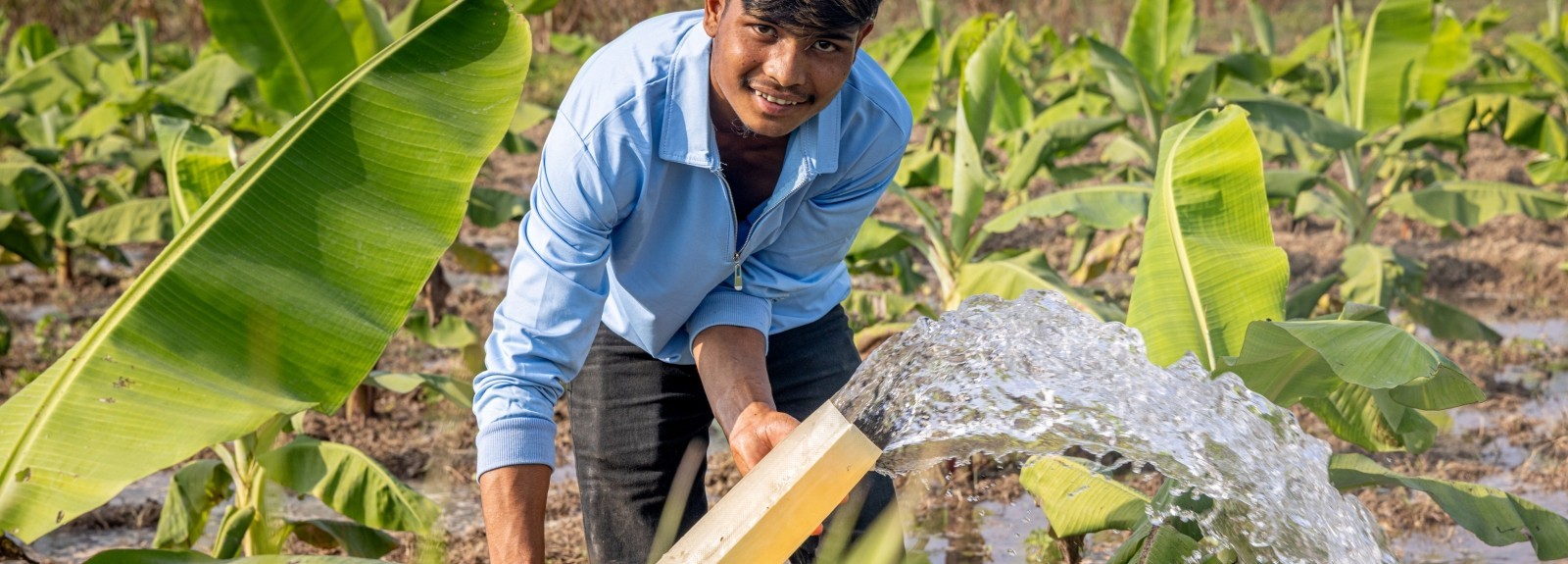Access to safe drinking water and sanitation are human rights. Despite the global target for clean water and sanitation through Sustainable Development Goal (SDG) 6, 2 billion people still lack access to safely managed drinking water at home.
The Corus International family of organizations is committed to addressing water, hygiene and sanitation (WASH) crises around the world. While prioritizing social and behavior change, our WASH programming employs a public health approach to WASH in emergencies, as well as sustainable water resource management for long-term development.
Guided by IMA World Health’s long-standing expertise, the Corus family continues to integrate WASH interventions into livelihoods projects as well as into broader primary health care delivery and health systems strengthening initiatives. By engaging with government, health and community leaders, we seek to accelerate change to bring equitable WASH access to all.
Learn more about our water work through these five global highlights:
DRC: WASH in emergencies
Renewed clashes in the Democratic Republic of the Congo (DRC) have forced millions of people out of their homes in the eastern provinces of North Kivu, South Kivu and Ituri, worsening the already dire humanitarian crisis. WASH needs are urgent across internally displaced person (IDP) camps, especially with an ongoing cholera outbreak that has affected around 20,000 people since December 2022.
Temporary displacement camp in Nyiragongo Health Zone, North Kivu, DRC.
In response to critical WASH needs and to support cholera response efforts in displacement areas, Corus organization IMA World Health partners with fellow humanitarian actors and government stakeholders to provide critical hygiene and sanitation inputs such as emergency latrines and showers, hygiene kits, and handwashing stations. By increasing access to WASH for IDPs and host households in the Nyiragongo health zone, IMA World Health is committed to reducing mortality and morbidity rates from waterborne diseases.
Musafiri Chiza washes his hands at the Rusayo IDP camp in Nyiragongo Health Zone, DRC.
Indonesia: Inclusive access to water and sanitation
The Multisectoral Collaboration for Inclusive Health and Opportunities for Women (MECIHO) project empowers women and improves the health, hygiene and living conditions of households and communities in Indonesia. Supported by The Starbucks Foundation, MECIHO responds to significant needs in coffee-growing communities in Karo Regency where one in four households lack clean water, sanitation challenges endanger public health, and current systems of local governance regularly exclude women.
MECIHO improves access to water and latrine facilities by facilitating the rehabilitation of public latrines. With an emphasis on community ownership, all community members, and especially women, are actively involved in both the planning and implementation of rehabilitation projects. At community meetings, women’s groups advocate for the inclusion of spaces for washing clothes and dishes within public latrines. This addresses a previously overlooked aspect of facility design that caters to women’s needs.
Through these interventions, communities in Karo now enjoy improved access to water and latrine facilities. To support sustainability, community members develop maintenance procedures that foster shared responsibility around the upkeep of public facilities.
Rut Yanti Ginting uses the rehabilitated public latrine in her community of Bulanjulu in Karo Regency, Indonesia.
Guatemala: WASH best practices
With one of the highest levels of chronic malnutrition in the world, food security is an urgent issue in Guatemala. Poor water quality is further compounding food security concerns - from the monitoring of 20% of the water systems in Guatemala, 54% were reported to be at high and imminent risk for human health.
Through the Improving Health and Nutrition in Guatemala’s Western Highlands project, Corus organization Lutheran World Relief partnered with FundaSistemas to improve nutritional outcomes and strengthen agricultural development in the San Marcos department of Guatemala. Applying innovative behavior change methodologies, the project utilized home visits, technical assistance and an arts-based community development (ABCD) curriculum to promote healthy food consumption, agricultural diversification, maternal and child health and WASH best practices.
The ABCD methodology proved to be remarkably effective in communities in San Marcos. Community members have improved their personal hygiene, which can lead to less infection and incidence of diarrhea, and learned to maintain cleaner and healthier home environments. The endline project study even found that 99% of participants had adopted best practices in the use and management of latrines.
Mali: Safe waste management
Access to safe water, sanitation and hygiene can protect children against common water-borne diseases such as diarrhea and can also reduce stunting, which affects more than 26% of children in Mali.
IMA World Health worked to improve the health of community members in central Mali’s Ségou Region through the Animal-Inclusive CLTS project, funded by the Osprey Foundation. By building upon the community-led total sanitation (CLTS) approach, the project piloted a WASH model that incorporates effective animal waste management strategies to improve child and household health outcomes.
Feeding the family goats in the Ségou Region of Mali (Jake Lyell for Corus)
Kenya: Urban WASH transformation
Only 29% of Kenyans have access to basic sanitation. In Nairobi City County (NCC), inadequate water and sanitation are among the biggest threats to child survival and overall development.
A street in the Mukuru slums of Nairobi City County (Sean Hawkey for Corus)
Led by IMA World Health, the USAID-funded Afya Jijini project worked to improve access to and quality of health services in NCC. The project strengthened county-level institutional capacity to manage health services, including quality WASH services as a core approach to reducing child mortality. Afya Jijini introduced urban community-led total sanitation (UCLTS) as a transformative approach to behavior change around sanitation in NCC, leading to reductions in cholera disease outbreaks and increased social cohesion.
Michael Maithya, a health worker with Afya Jijini, speaks with a colleague at a Community Outreach Event in Kamukunji, Nairobi.

